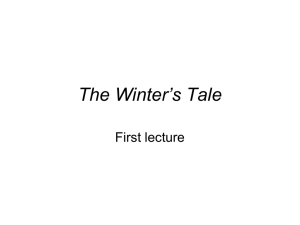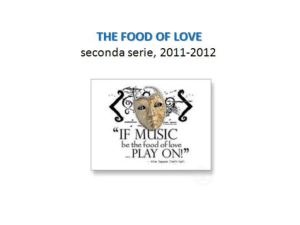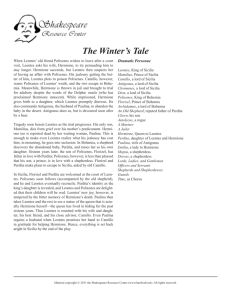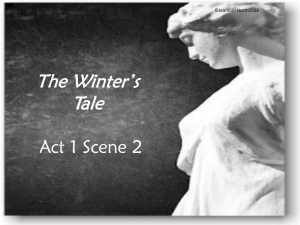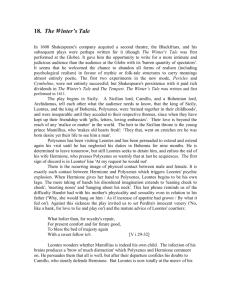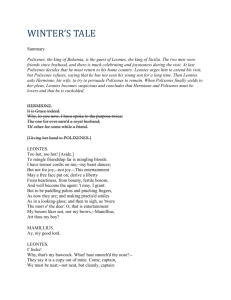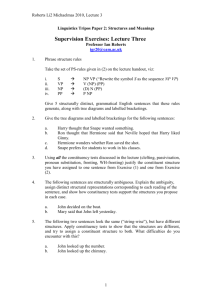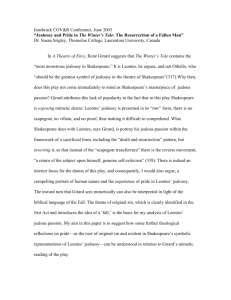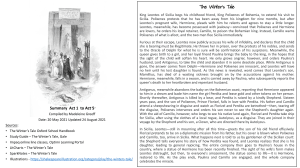a printable version
advertisement
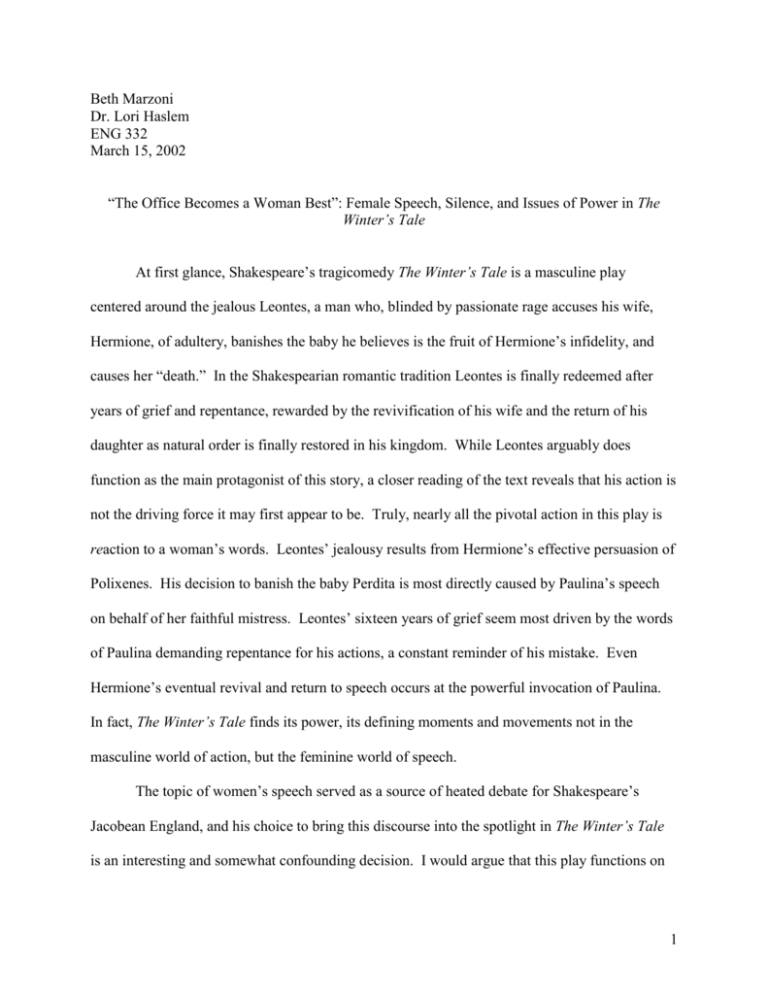
Beth Marzoni Dr. Lori Haslem ENG 332 March 15, 2002 “The Office Becomes a Woman Best”: Female Speech, Silence, and Issues of Power in The Winter’s Tale At first glance, Shakespeare’s tragicomedy The Winter’s Tale is a masculine play centered around the jealous Leontes, a man who, blinded by passionate rage accuses his wife, Hermione, of adultery, banishes the baby he believes is the fruit of Hermione’s infidelity, and causes her “death.” In the Shakespearian romantic tradition Leontes is finally redeemed after years of grief and repentance, rewarded by the revivification of his wife and the return of his daughter as natural order is finally restored in his kingdom. While Leontes arguably does function as the main protagonist of this story, a closer reading of the text reveals that his action is not the driving force it may first appear to be. Truly, nearly all the pivotal action in this play is reaction to a woman’s words. Leontes’ jealousy results from Hermione’s effective persuasion of Polixenes. His decision to banish the baby Perdita is most directly caused by Paulina’s speech on behalf of her faithful mistress. Leontes’ sixteen years of grief seem most driven by the words of Paulina demanding repentance for his actions, a constant reminder of his mistake. Even Hermione’s eventual revival and return to speech occurs at the powerful invocation of Paulina. In fact, The Winter’s Tale finds its power, its defining moments and movements not in the masculine world of action, but the feminine world of speech. The topic of women’s speech served as a source of heated debate for Shakespeare’s Jacobean England, and his choice to bring this discourse into the spotlight in The Winter’s Tale is an interesting and somewhat confounding decision. I would argue that this play functions on 1 some level as Shakespeare’s reaction and engagement in this controversy, and that with it he takes an almost feminist stance, creating an argument not only for speech as the woman’s greatest asset and tool regardless of the danger involved in wielding it, but as the source of all her power in a world that refused to regard her as much more than a marital status or a sexual being. During the English Renaissance, there were three identities available to women: widow, wife, or maid. Further, there were two possible existences within each of these categories, as one either fulfilled them dutifully (which to many individuals of the time meant beauty, chastity, modesty, humility, constancy, etc.) or one was deviant in her role, acting as either a strumpet or a shrew. Probably because her most seemingly universal trait at the time was her “interminable speech,” a woman’s position was most defined by her discourse (Woodbridge 86). In fact, as Paulina hints, any discourse at all seems to have been a damnable act, filtering her either as seductress or shrew; a good woman stayed silent or if she “prove[d] honey-mouth’d, let [her] tongue blister” (II.i.31). Shakespeare’s tale certainly begins in the realms of the anti-feminist writings of his time. Shakespeare puts this model and these beliefs directly into action in his text. He creates a wife, Hermione, whose tongue gets her into trouble, labeling her an infidel in the eyes of her incredibly misogynistic husband who believes that women “will say any thing” (I.ii.131). The reader’s first interaction with Hermione is a persuasive one in which we are exposed to her command of language, but also her seductive power: Verily, You shall not go; a lady’s “verily” is As potent as a lord’s. Will you go yet? Force me to keep you as a prisoner, Nor like a guest: so you shall pay your fees 2 When you depart, and save your thanks. How say you? My prisoner? or my guest? By your dread “verily,” One of them you shall be. (I.ii.49-56) The seductive qualities of this speech are highlighted by the fact that Hermione’s other moment of verbal triumph was the wooing of her husband (I.ii.101-5). Finally, her words paint her hungrily with strong sexual overtones as she begs Leontes to disclose this other fine verbal act that she has forgotten: “I prithee tell me; cram ’s with praise, and make ‘s / As fat as tame things. One good deed dying tongueless / Slaughters a thousand waiting upon that. /…I long” (I.ii.91101). Yet, Shakespeare undermines the strumpet model, ensuring that Hermione is a sympathetic character by developing the traditionally anti-feminist tyranny of Leontes, even dealing him power over Hermione’s very words that incense him so. When unable to convince Polixenes to stay himself, he calls his wife out of her proper silence: “Tongue-tied our queen? Speak you” (I.ii.27). In fact, this is Hermione’s only scene in which her words could possibly be interpreted to label her as linguistically or literally loose. In subsequent scenes, when accused of infidelity by Leontes, Hermione not only defends herself eloquently, but shows a proper woman’s respect for silence, stating, “There’s some ill planet reigns; / I must be patient, till the heavens look / With an aspect more favorable,” and ending her arguments (II.i.105-7). Further, the end of the first half of the play links Hermione to the Oracle, the most (and possibly only) objective source of language in the entire play. She appears to Antigonus in a dream, speaking of fate and prophesizing the future in the same style as the Oracle at Delphi: Since fate… Hath made thy person for the thrower-out Of my poor babe, according to thine oath, Places remote enough are in Bohemia, 3 There weep and leave it crying; and for the babe Is counted lost for ever, Perdita I prithee call’t. For this ungentle business, Put on thee by my lord, thou ne’er shall see Thy wife Paulina more. (III.ii.28-36) In this way, Shakespeare adopts the anti-feminist stereotypes of his time, but quickly unravels them in his text, creating in Hermione, a perfectly upstanding wife who, though accused of betraying her husband on no proof greater than speech, is in reality betrayed by his rash actions. Shakespeare succeeds in turning much the same brand of typecasting on its head with his widow, Paulina. From the first moment the audience sees Paulina in action, railing against Leontes, she is marked as a shrew: “Fear you his tyrannous passion more, alas, / Than the Queen’s life? A gracious innocent soul, / More free than he is jealous” (II.iii.27-9). Critics Henderson and McManus point out, however, “Paulina addresses [Leontes] respectfully throughout their entire dialogue, while Leontes falls from regal and courtly language into the shrill invective of the misogynist pamphlets” (96). As Woodbridge observes, “many Renaissance attitudes toward women originated in ridiculous jests” and jokes, one of the most popular of which is reflected in Leontes’ interaction with Antigonus (118). Casting him in the role of shrew’s husband, Leontes’ speech towards Antigonus in this scene centers on his inability to control his wife: “A gross hag! / And, lozel, thou art worthy to be hang’d / That wilt not stay her tongue” (II.iii.108-10). Antigonus responds with the conventional jab, “Hang all the husbands / That cannot do that feat, you’ll leave yourself / Hardly one subject” (II.iii.110-12). Thus, not only Paulina as an individual, but also her relationship is marked by the traditional misogynist notions of a shrew though her speech has been delivered with a concern and respect unbecoming of a true shrew. In fact, as Henderson and McManus assert, “Paulina…is not a shrew; she is rather a woman with the courage that all of Leontes’ lords lack” (119). 4 With her report of Hermione’s “death,” Paulina begins to turn the tide for women’s speech in the play, truly expanding its power beyond that allowed in any category created by the controversy over women. First, Paulina shifts silence from a feminine act of passivity to a poignant and active statement of female power. Earlier in the play, it is suggested that Paulina understands the potential here. When hoping to sway Leontes opinion of Hermione with the sight of his child she states, “The silence of pure innocence / Persuades when speaking fails” (II.i.39-40). Her announcement regarding the ultimate silence, death, serves as the catalyst for change in Leontes. As she begins to rail on the tyrant once again, he gives in: “Go on, go on; / Thou canst not speak too much, I have deserv’d / All tongues to talk their bitt’rest” (III.ii.214-6). Hermione’s “death” and Paulina’s speech also creates the sixteen year “silence” in the play that separates its two halves, but that is anything but empty, filled with the growth of Perdita and Florizel and, most importantly, the grieving of Leontes. Further, directly following this scene is a powerful moment of feminine power: Antigonus’ dream and his death, the famous stage direction “Exit pursued by a bear.” The connection between the incensed mother of Antigonus’ dream and his encounter with the bear cannot go unnoticed. As Linda Woodbridge reports in her study of anti-feminist publications circulating around the time Shakespeare wrote The Winter’s Tale, “The Lyon being bitten with hunger, the Beare being robbed of her young ones, the Viper being trode on, all these are nothing so terrible as the fury of a woman” (83, italics mine). It seems impossible not to relate the instance of the bear to a developing notion of feminine control in this script. Perdita, Shakespeare’s maid, balancing (sometimes precariously) on the thin line of proper feminine behavior, is one example of the change that comes with the silence and the 5 second half of the play. In the grand pastoral scene Perdita has definite moments in which she does not seem to fit traditional molds of maidenly behavior, at points becoming downright sexual with her speech, such as would never be accepted or tolerated by misogynists, horrified by the unchaste maid. Expressing her wish to adorn Florizel with flowers, he jestingly asks “What? like a corse?” and Perdita replies, “No, like a bank, for love to lie and play on, / Not like a corse; or if—not to be buried, / But quick and in mine arms” (IV.iv.129-32). While such a statement is an ever grosser example of seductive language than Hermione’s deadly words in Act One, no character so much as chides Perdita. Instead, even Polixenes and Camillo comment on her noble character, referring to her as “queen of curds and cream” (IV.iv.161). Once we return to Sicilia, the power shift that accompanies silence in this play becomes even more conspicuous. During the time that has passed, Paulina has become Leontes’ most trusted advisor. She has become, “my true Paulina” and has convinced Leontes to agree not to marry until she bids such an affair (V.i.81). As Woodbridge argues, Paulina has risen to the position of directing the action of the play, stage-managing “events to achieve a happy ending” (247). One such occurrence is the final scene of the play, wherein Leontes and the very alive Hermione are reunited and Perdita meets her mother for the first time. Yet, the question remains as to whether this “happy ending” is truly happy for all involved. Critic, Valerie Traub, insists that, “rather than being a victory for the wronged heroine, the final scene works as wish fulfillment for Leontes, who not only regains his virtuous wife and loses his burden of guilt, but also reassumes his kingly command of all social relations” including control over Paulina (135). It is quite possible to read the final scene of The Winter’s Tale and be left with the impression that this really is a male centered text wherein the fact that Leontes is restored is the only disappointing reality. However, such a reading ignores how 6 exactly the play worked to get to that point. Once this is taken into consideration, it is impossible to ignore the verbal power of women in this text. Traub views the silence of Hermione during her death an exercise in chastening and restricting the erotic power she exhibited in Act One. “Upon her revivification,” Traub asserts, “Hermione is granted one speech of eight lines, and this speech a maternal blessing and query directed towards her daughter. Her silence towards Leontes bespeaks a submissiveness most unlike her previous animation” (135). I would argue that this reading is severely flawed in that it ignores the function of female silence in this text. No longer is it “submissiveness,” but an action powerful in its own right. Secondly, Traub ignores the context surrounding Hermione’s speech; this character does not just suddenly choose to ditch her disguise, to live and speak again, but is almost ritually awoken by Paulina’s words: Music! awake her! strike! ‘Tis time; descend; be stone no more; approach; Strike all that look upon with marvel… …You perceive she stirs. Start not; her actions shall be holy, as You hear my spell is lawful. Do not shun her Until you see her die again, for then You kill her double. (V.iii.98-107) Even Leontes responds to this powerful speech: “If this be magic, let it be an art / Lawful as eating” (V.iii.110-1). Finally, Traub’s conclusions ignore the meaning behind the fact that Hermione’s eight lines are directed at her daughter. Hermione’s “death” occurs because of the death of her son, Mamillius. The imagistic and semantic bonds of motherhood tie together Antigonus’ dream and his death by bear. Leontes plays no part whatsoever in the return of Hermione; it is based completely on the discovery and return of Perdita and Hermione’s chance to become a mother again. 7 Thus, this scene, orchestrated by Paulina, is the reconciliation of all of the feminine themes in The Winter’s Tale. Motherhood once again is a strong and visible bond on the stage. Though we do not have the visual reminder of a pregnant Hermione, we watch her reunion with Perdita. The misogynist classifications of strumpet and shrew have been dismantled. Female language has risen from “interminable talk” that only serves to mark one as being an imperfect woman, to a respected, prophesying, and even magic art form. Finally, women’s silence has progressed from a passive and proper state of submissive existence to a conscious and powerful action that extends to shape the greater structure of the play. And, language, not action, has been the driving force behind it all. 8 Works Cited Henderson, Katherine Usher and Barbara F. McManus eds. Half Humankind: Contexts and Texts of the Controversy about Women, 1540-1640. Urbana: University of Illinois Press, 1985. 118-119. Shakespeare, William. The Winter’s Tale. The Riverside Shakespeare. 2nd Ed. Ed. G. Blakemore Evans et al. Boston: Houghton, 1997. 1617-1651. Traub, Valerie. “Jewels, Statues, and Corpses: Containment of Female Erotic Power in Shakespeare’s Plays” in Shakespeare and Gender: A History. Ed. Barker and Kamps. London: Verso, 1995. 114-138. Woodbridge, Linda. Women and the English Renaissance: Literature and the Nature of Womankind, 1540-1620. Urbana: University of Illinois Press, 1986. 9

